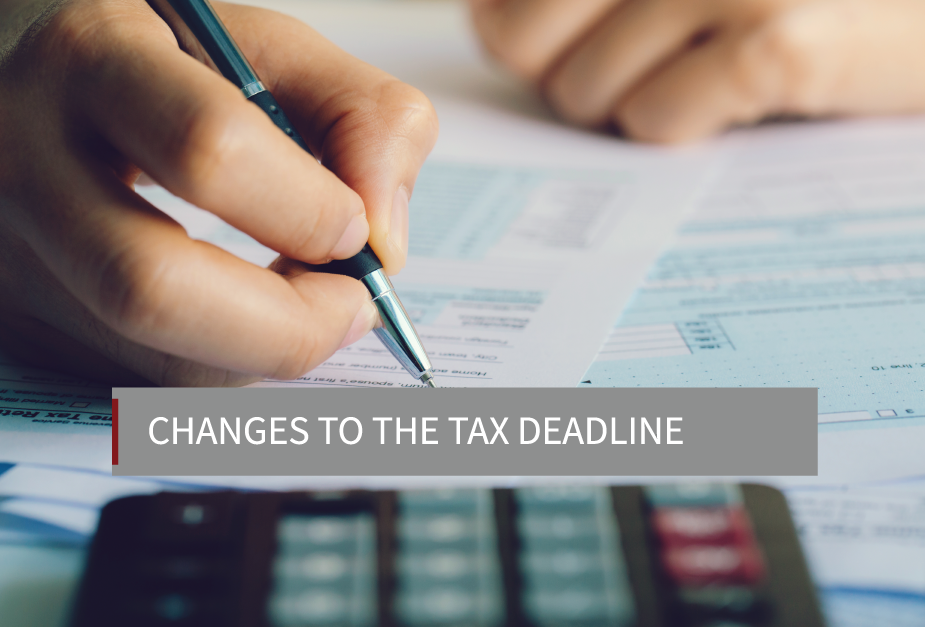2020 was a difficult financial year for many Americans. A Pew Research Center survey found that one in four adults in the United States have had trouble paying their bills since the beginning of the COVID-19 pandemic.
More Flexibility For Taxpayers
This financial strain on American families and individuals represents stress each month when bills are due. And now, in the midst of tax season, many households are experiencing additional strain.
Historically, federal and state taxes have been due on April 15th. Luckily, the Internal Revenue Service (IRS) has taken steps to relieve the acute pressure on Americans’ finances.

Changes to The Tax Deadline
Last year, the IRS extended the filing deadline for 2019 taxes to July 15th. This gave taxpayers an additional three months to compile their tax returns and pay any taxes due. This was a crucial step as the United States experienced its worst economic crisis since The Great Depression.
This year, in light of the continuing crunch on American finances, the IRS has again extended the deadline for filing annual taxes.
The deadline for filing federal 2020 taxes has been pushed to Monday, May 17th, 2021.
This new due date also applies for any tax payments owed to the federal government. You will be able to make tax payments for the 2020 financial year until May 17th, 2021, without accruing additional interest or penalties.
Many states have also extended their deadlines for 2020 tax returns. As of April 1st, 2021, 41 states have changed their due date to reflect the federal adjustment.
The State of California Franchise Tax Board has also extended the deadline for 2020 tax returns and payments to May 17, 2021.
If you live in California, you have an extra month to file your taxes. This will hopefully reduce some of the strain on taxpayers who have been struggling to make ends meet during the COVID-19 pandemic.
These changes are automatic and apply to all taxpayers. You do not need to file for an extension to take advantage of the May 17th deadline, federally or at the state level.

What to Do If You Still Need More Time
If you require more time beyond this new deadline to compile your tax return, you should file for an extension. With an extension, you have until October 15, 2021 to file your tax paperwork.
However, if you file for an extension, your tax payments will still be due on May 17th, 2021. If you require an extension on your taxes, you should make estimated payments to the IRS and your state agency. Otherwise, you will accumulate penalties and interest on your tax burden. This could end-up costing hundreds of additional dollars.
To take advantage of the October 15th deadline, visit IRS.gov to submit an electronic request for an additional extension. You should also click here to submit an estimated payment toward your 2020 taxes.
If you are unsure how much to pay in estimated taxes, your previous years’ tax payments are a good guideline. If your salary has not changed significantly and you have not acquired any major new assets (such as a home or car) then you might consider paying the amount you owed in past years.
However, this is not a foolproof method for estimating the amount you owe. The Tax Cuts and Jobs Act, passed in 2017, introduced annual changes to the tax code that could affect the amount you owe on your 2020 taxes.
If you pay estimated taxes but your payments are less than the total amount you owe to the IRS or state agency, you will owe additional interest and penalties.
For this reason, it is recommended that if you must file for an extension, you work with a tax professional to estimate your taxes due.

When to Go with a Professional Tax Preparer
If your financial picture significantly changed in 2020, or if you are filing for an extension, a tax professional’s assistance can be invaluable.
While you can file your taxes without an expert’s assistance, partnering with a professional ensures that you get the maximum refund you are owed. It also minimizes your risk of owing additional monies.
The 2017 Tax Cuts and Jobs Act did streamline several parts of the federal tax code, but filing taxes without the assistance of a professional is still a risky business.
Supposedly “free” programs like TurboTax often have hidden costs for filing state returns, itemizing deductions, and submitting multiple W-2s or 1099s. These costs can add-up, and the automation of such programs cannot compete with the critical eye of an expert.

Expert Tax Help is Available in San Rafael
Books in Balance is here to help residents of San Rafael and the wider Bay Area. Since 1999, we have helped thousands of Californians prepare their tax returns.
Tax season doesn’t have to be a hassle. Let the experts handle your returns while you handle your life.
Our office is in downtown San Rafael in the Chase building on 4th Street. Call our office at (415) 455-9455 to schedule a free one-hour consultation right now.
- Preparing Your Tax Documents - February 1, 2024
- Making of a Successful Team Environment - December 31, 2023
- Got a Mistake on Your Tax Returns? - September 3, 2023

